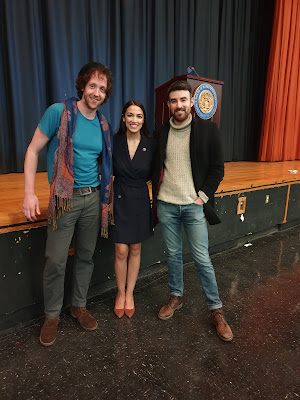Watching The Wire with my Dad (minor spoilers)
Last year I convinced my Dad to join me in watching my favourite TV series, The Wire. I'd been pestering him for ages to check it out and even bought him the box set for Christmas a few years ago. He was never dismissive, he just never seemed to get around to it (these epic dramas are a commitment, to be fair). Last summer, when I was living with my parents for a few months, he eventually caved.
As I expected, he was a big fan. We didn't race through the
series, but watched it steadily - maybe an episode or two every couple of
nights for a few months. Viewing it for the third time, but having not seen
some of the episodes for several years, I was struck by how laugh-out-loud
funny some of it is. I remember the show's creator, David Simon, saying that
without the humour it would be unwatchable, such is the tragedy, decay and
corruption depicted in early 2000s Baltimore. It's also glaring how much the
technology has evolved since that period. The subject of the police
investigation in Season One, with the wire-tapping of payphones and disposable
cells - "burners" - feels very antiquated now.
Thematically, however, the show remains very relevant, even prescient, on a range of issues, from police brutality to automation to the concept of 'fake news'. Take Season Two, for example. The shift in focus to the predominantly white longshoreman on the docks was jarring for some viewers, but it was an essential component to the series and continues to tell important truths about contemporary America. Writer Ta'nehisi Coates put it well:
In Season One...the image of these black drug dealers is well within the imagination. That's not a shot at it, because it's done really, really well. Season Two, it’s like, oh you thought this was some black shit? No, this is Baltimore, man. Quietly, it just flips. And as a person that grew up in Baltimore, I knew there were poor white people in Baltimore who had these problems. They're saying, "this ain't just black folks". This is the system at large and it's eating at everything.
It's become a cliché to attribute Trump's victory to a revolt of the neglected “white working class” when the picture is more complex. Coates himself has countered this, stating that the 2016 election result owed as much if not more to the votes of wealthy whites, and has argued persuasively that racism and white supremacy were at least as much of the driver as economic insecurity. However, in the plight of Frank Sobotka and the other dock workers, you can see the dangers of rapid de-industrialisation and rising inequality, and the desperate lengths to which people will go when their communities and livelihoods have been treated as expendable for decades. When capitalism triumphs, labour is inherently worth less. This is equally clear in the portrayal of the rampant drug trade in the mostly black housing projects. The Wire also briefly touched on voter suppression in black communities, which the Republicans can no longer win nationally without.
Baltimore and Maryland are solidly Democrat, but these issues are applicable to other states which turned to Trump. I'm reminded of this interview with Nic Smith, an activist in West Virginia coal-country and self-described “white trash hillbilly from the holler”, who eloquently addresses some of these dynamics:
In Season Three, Bunny Colvin's attempts to establish a legalized drug zone, monitored by community activists and public health professionals rather than cops, could be seen as an early example of a vision to defund the police. Another prophetic storyline occurs in Season Five, which focuses on McNulty’s manufactured homeless killings and the reporting on it by the beleaguered Baltimore Sun newspaper. Many critics have identified this as the weakest season, arguing that the rather preposterous plot goes against the rest of The Wire’s usual commitment to verisimilitude. I think the storyline works well as a comment on the undermining of journalism and mistrust of experts, especially in the present day ‘post-truth’ and ‘fake news’ context. It probably does suffer from being more didactic and less morally ambiguous than the rest of the show. The Wire very effectively avoids a binary 'good guys and bad guys' trap, but some of the characters in the newsroom in Season 5 are possibly not quite as nuanced. Overall though, I still love it.
As I settle down for season finale, I’m thinking of my Dad and wishing he could be here watching it with me. We made it to the second last episode of Season Four before he died. I miss discussing the politics of it with him, his scathing comments when a character did something stupid (“He’s an eejit!”) and his earnest compassion for the school pupils in Season Four, trapped in the system ("These are good kids!"). While I'm happy we watched the majority of it together, it’s a shame he never saw some of the great scenes that were still to come. One of my favourites is in the penultimate episode, when the lovable Bubbles, a recovering drug addict, confronts his past demons at his recovery group meeting. Amid all the bleakness and adversity, Bubbles' redemption is uplifting. “Ain’t no shame in holding onto grief", he says, "as long you make room for other things too.”









Comments
Post a Comment